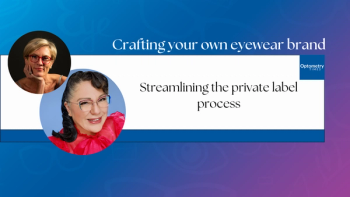
What's in store for optometrists in 2025 and beyond?
From new treatments on the horizon for macular degeneration to strengthening comanagement ties, optometrists cite a lot to be excited about in the coming year.
Optometrists envision significant advancements in their field over the next 5 years. Key changes include embracing a medical eye care model, addressing patients' sports and recreational needs, increasing awareness of the profession's capabilities, and adopting light therapy for various conditions. They anticipate the development of new treatments like eye drops and oral medications for diseases such as diabetic retinopathy and macular degeneration. There is also excitement about artificial intelligence-enhanced retinal screening tools and a holistic approach to patient care, incorporating lifestyle factors like nutrition and exercise. Lastly, there is a push for better inter-referral systems and comanagement among optometrists and ophthalmologists to enhance patient care.
Video transcript:
Editor's note: The below transcript has been lightly edited for clarity.
Emily Kaiser Maharjan:
What change would you like to see in optometry within the next five years?
Justin Schweitzer, OD, FAAO:
Yeah, it's a great question. There's probably plenty of things we all could think of from an optometry standpoint that we'd love to see change. I think, for me right now, it's starting to happen, and I hope it continues to evolve, which is just optometrists continue to embrace the medical eye care model, embracing the medical caring of patients. I think we're already doing that, but I want to see even get more and more involved, really. Because if you just look at the data, the stats around the sheer number of patients that are going to end up with ocular disease, glaucoma, macular degeneration, ocular surface disease, corneal conditions, it's just something that we have no choice. We have to embrace [it] to provide the best possible care for our patients. And we're doing a good job of it, but we can do a lot better, and I hope we continue to evolve in that way.
Graham Erickson, OD, FAAO, FCOVD:
So in 2025 and in the next 5 years, I would like to see optometrists do more for their patients in terms of their sport and recreational pursuits. I think optometry is really good at addressing either academic or occupational needs of our patients, but often we neglect the sport recreation part of their life. I think it's a great way to connect with patients and provide them an added bonus to the care that we deliver, to be able to help them in that part of their life. It's often a part they're more passionate about.
Raman Bhakhri, OD, FAAO:
There's a bunch of different things that could change. I feel like there'd be a laundry list or a wish list that if you ask that question to some other people, they'd just keep going and going. The only thing that really comes to my mind, off the top of my head, is just an increased awareness in our profession, our colleagues, what we can all do in terms of helping our patients. Whether that's fitting them with a contact lens to control myopia, whether it's diagnosing glaucoma, diagnosing an inherited retinal disease, helping a patient that's legally blind, whether it's our low vision friends, there's so many things that we can do. And I just feel like there should be more of awareness to, again, all the things that we can provide.
Roya Attar, OD, MBA, DHA:
The biggest thing I'm excited about is light therapy for all kinds of conditions. We know we started out for dry eye disease. Now it's being approved for macular degeneration and advanced forms of it. So I am so excited about that, because that's something that we can own. We can own that space, and I can take care of those patients instead of having to speak to them, so that they have to go to a retinal specialist, wait a long time in that clinic, and we already have that established relationship. So with this new therapy, I am so excited for it. I'm also excited for what's on the horizon. A lot of talks have mentioned certainly eye drops or oral medications that can treat a lot of these conditions that we see a lot of patients with, such as diabetic retinopathy and macular degeneration. So yes, I'm very excited for what's on the horizon.
Lisa Hornick, OD, MBA, FAAO:
So what I would like to see change in optometry is looking at the patient as more of a whole person, and just not this set of eyeballs. So I would love to have more lifestyle interventions in our general practice, even in our primary care practice, not just specialties. I would love more to look at things like nutrition. I would love to look at exercise, stress, sleep, and just look at how all of those lifestyle factors are affecting our patients as a whole.
Steven Ferrucci, OD, FAAO:
My main focus is usually retina stuff, so I think about more what's going on retina, but there's a couple new medications, perhaps, coming out for wet AMD, that I'm excited about. I think we, in a perfect world, we would get away from injections every month or every other month, so longer acting medications that will allow the retinal specialist to decrease the burden on the patient, I think is good. Also, there's some exciting technology coming out with AI in regards to retinal screening. There's a company – Optomed – that has a new camera. It's a handheld camera that uses AI to screen for diabetic retinopathy. So I think that's exciting, and it opens up opportunities, perhaps, for optometrists to get involved with that AI and involved in diabetic screenings. So I think that's exciting as well.
Brooke Messer, OD, FAAO, FSLS:
Something that I would like to see in optometry in 2025 and beyond, is the adoption [of] and pursuing medical optometry across all modalities of practice. I think one thing that we can learn from our ophthalmology partners is recognizing our peers who specialize in certain parts of optometry and create those interreferrals and trust that we can comanage patients together, so that if you have a special interest and your colleague has another, build those comanage patient referrals and build that trust within the families that hey, you know, I'm not the best person to manage a certain condition, but my colleague is. We've been working really hard on that in my area to create those referrals between optometrists, and it's been working really nicely to build not only the patient connection between both providers, but also I've really been appreciating the relationships that I now have with my other local optometrists. And I really enjoy not only the professional relationship, but the personal relationships that have built from that as well. So if you have a special interest in optometry, I encourage you to totally pursue it, connect with others, connect with mentors who have the same interests, and then connect with others who have different interests, so that we can maximize patient access to care. Because we as optometrist are on the front line to eye care, and patients deserve to be treated as soon as they need it, rather than having to wait for a referral when it's something that we as a profession could take care of.
Newsletter
Want more insights like this? Subscribe to Optometry Times and get clinical pearls and practice tips delivered straight to your inbox.












































.png)


